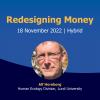
We invite folks to join us for a conversation on Redesigning Money for Sustainability. This hybrid / virtual discussion will focus on the work of Alf Hornborg, who has shown how general-purpose money (or all-purpose money) drives unsustainable industrial culture and why the design of money must change to enable transformation to sustainable culture.
The in-person meeting will be at IIASA in Laxenburg, Austria. Virtual participation will be available. The meeting will last an hour to an hour and a half. We will hear from Dr. Hornborg, Human Ecology Division, Lund University, share thoughts and ideas, and begin collaboration toward further discussions and projects on redesigning money.
An excerpt of his recent book chapter is below:
“The conundrum of unequal exchange is that it is an inevitable consequence of the conjunction of all-purpose money and the Entropy Law, which, as we have seen, rewards the dissipation of resources with more resources to dissipate. Getting the prices right by “internalizing the externalities” and adjusting the “underpayment” of labor and resources can leave no margins for the “value added” of capitalist industry. In not acknowledging this conundrum, all such proposals are logically flawed. More bluntly phrased, no industrial processing, whether “capitalist” or not, can compensate for the material disorder it generates, regardless of how much money can be mobilized. This is the conundrum implied by Nicholas Georgescu-Roegen (1971) fifty years ago. The implication, as I see it, is that unequal exchange cannot be rectified within the current paradigm of all-purpose money but requires us to think outside the box of economics. We cannot change the Entropy Law, but, as I have indicated, we can change the design of money.
The far-reaching implications of the acknowledgement of ecologically unequal exchange (EUE) should not deter us from revealing the material asymmetries of world trade documented in this book. The discipline of economics must be made aware of the biophysical consequences of what they celebrate as free trade and economic growth. This does not mean disagreeing with mainstream economists about the subjective constitution of economic value, as would proponents of labor or energy theories of value, but to request that they address the incontrovertible contradiction between all-purpose money and the Entropy Law. MRIO analyses have a crucial role to play in empirically demonstrating the pervasive material asymmetries generated by globalization. The resistance of economics to acknowledging the implications of these asymmetries is predictable, but without breaking that resistance there is little hope for the kind of rethinking that is essential for the future viability of the biosphere.”
Additional reference we can read and discuss:
Hornborg, A. (2022). Limiting money: Redesigning the artifact that shapes modern people. Forthcoming in a special issue of Sustainability Science.
To participate virtually, please contact Brian Fath
Upcoming Events
Austrian Academy of Sciences, Dr. Ignaz-Seipel-Platz 2, 1010 Vienna
